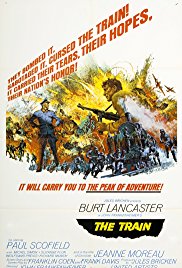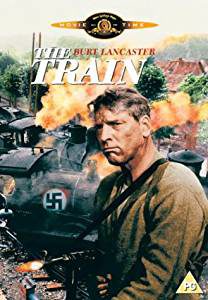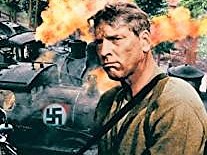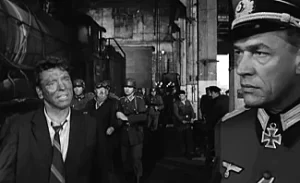The Train **** (1964, Burt Lancaster, Paul Scofield, Jeanne Moreau, Michel Simon, Suzanne Flon, Albert Rémy, Charles Millot) – Classic Movie Review 7,050
The smart and exciting 1964 wartime action thriller The Train stars Burt Lancaster as a French Resistance leader trying to hijack the train-load of French art treasures a fanatical German Colonel (Paul Scofield) is sending home to Germany in 1944.
Director John Frankenheimer’s smart and exciting 1964 black and white wartime action thriller The Train is based on the 1961 non-fiction book Le front de l’Art by Rose Valland and stars Burt Lancaster as French Resistance leader and station master Paul Labiche, who is trying to hijack the train-load of French art treasures that fanatical German Colonel Franz Von Waldheim (Paul Scofield) is sending home to his Nazi fatherland in 1944.
Labiche’s little group of Resistance fighter saboteurs must stop the theft and stage an elaborate ruse to keep the train from leaving France without damaging the precious cargo.
Lancaster in his prime makes a sterling hero, though never seems very French of course, but Jeanne Moreau as innkeeper Christine and Michel Simon as engine driver Papa Boule, Suzanne Flon as Mlle Villard, Albert Rémy as Didont and Charles Millot as Pesquet are among the many real French participants in this American-French co-production.
With its stonking action sequences, especially the rail yard climax, and gripping acting by the stars, The Train is one of the great train movies and is a must see for anybody who ever had a train set. The Train contains multiple real train wrecks in the days before CGI.
Franklin Coen and Frank Davis were Oscar nominated for Best Writing, Story and Screenplay – Written Directly for the Screen.
Also in the cast are Wolfgang Preiss, Richard Munch, Jacques Marin, Paul Bonifas, and Jean Bouchaud, Howard Vernon, Richard Bailey, Gérard Buhr, Jean-Pierre Zola, Donald O’Brien, Arthur Brauss, and Jean-Claude Bercq.
Much of the film is shot on location. Filming took place in Acquigny, Calvados; Saint-Ouen, Seine-Saint-Denis; and Vaires, Seine-et-Marne.
Original director Arthur Penn was replaced by Frankenheimer three days into filming in France. Lancaster had Penn fired and called in Frankenheimer. Penn wanted a more intimate film while Lancaster wanted more emphasis on action. The budget was doubled and filming stopped briefly while the script was rewritten. Frankenheimer got his name as part of the full title John Frankenheimer’s The Train, total final cut and a Ferrari. Out of this mess, somehow came this remarkable movie.
The astonishing black and white cinematography involves long tracking shots and wide-angle lenses, with deep focus photography. Frankenheimer recalled: ‘I think this is the last big action picture ever made in black and white. I am so grateful. I think the black and white adds tremendously to the movie.’
It is inspired by real-life train Number 40,044, seized and examined by Lieutenant Alexandre Rosenberg of the Free French forces outside Paris. The French Resistance held up the shipment of art the Germans were trying to take out of Paris on 1 August 1944 with an endless barrage of paperwork and red tape and made it to a railyard a few miles outside Paris.
French art historian Rose Valland documented the stored works of art looted by the Germans from museums and private art collections.
The Train [Le Train] is directed by John Frankenheimer, runs 140 minutes, is made by Les Productions Artistes Associés, Les Films Ariane and Dear Film, is released by United Artists, is written by Franklin Coen, Frank Davis (screen story and screenplay), Walter Bernstein, Howard Dimsdale and Nedrick Young (uncredited), and Albert Husson (French version), based on the book Le front de l’Art by Rose Valland, is shot in black and white by Jean Tournier and Walter Wottitz, is produced by Jules Bricken, and scored by Maurice Jarre, with Production Design by Willy Holt.
The cast are Burt Lancaster as Paul Labiche, Paul Scofield as Colonel Franz von Waldheim, Jeanne Moreau as Christine, Suzanne Flon as Miss Villard, Michel Simon as Papa Boule, Wolfgang Preiss as Major Herren, Albert Rémy as Didont, Charles Millot as Pesquet, Jean Bouchard as Hauptmann Schmidt, Richard Münch as General von Lubitz, Jacques Marin as Jacques, Paul Bonifas as Spinet, Donald O’Brien as Sergeant Schwartz, Arthur Brauss as Leutnant Pilzer, Bernard La Jarrige as Bernard, Daniel Lecourtois as Priest, Gérard Buhr as Corporal, Howard Vernon as Hauptmann Dietrich, Nick Dimitri as German soldier, Christian Fuin as Robert, and Christian Rémy as Tauber.
© Derek Winnert 2018 Classic Movie Review 7,050
Check out more reviews on http://derekwinnert.com





